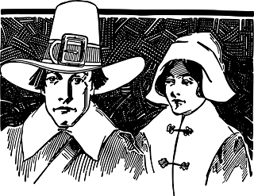 When sitting down to Thanksgiving dinner this year, you can describe the meal as scrumptious and know none of your older family members can accuse you of making up words.
When sitting down to Thanksgiving dinner this year, you can describe the meal as scrumptious and know none of your older family members can accuse you of making up words.
Since 2000, Oxford English Dictionary has made quarterly amendments to revise, update, and add new entries. This accelerated cadence is surely a sign of how quickly our language is morphing, growing, and if you ask older generations – falling apart!
This past September, besides scrumptious (a nod to Roald Dahl’s birth 100 years ago), OED also officially identified the following as words:
- YOLO – the abbreviation for ‘You Only Live Once'
- Clicktivist – someone who uses social media and other online methods to promote a cause
- Squee – a high-pitched squealing or squeaking sound
Many of the words added to the most recent list might make your grandma or uncle want to squee out of annoyance, but here’s your chance to remind them that our language looks and sounds different than it did 25 years ago, and very different than 50 years ago, and very, very different than 75 and 100 years ago.
Slang words are some of the most obvious and colorful indicators of a generation’s lexicon. Today, a girl might be called a bae, but in the ’70s she’d be a bunny, and in the ’40s a baby-doll. Even the way we greet each other has changed quite drastically in the past few decades, thanks to the “casualization of language.” While your grandfather may have said hello to someone with a “How do you do?” today you’ll hear exchanges of “How’s it going?” or “What’s up?”
This article points out a few of the subtle ways our grammar and language are changing. The words shall and ought are now replaced with the more affirmative will, should, and can. And “to be” is taking a new form in what linguists call the “get-passive.” Instead of “the car was stolen,” a friend looking for a ride might tell you “the car got stolen.”
But why does our language change at all, and why does it seem to be evolving so quickly now? The Linguistic Society of America lists two main reasons languages change:
- the need to describe new products and technologies, and
- exposure to new people, places, things, and words.
With innovation as prolific as ever, it’s no wonder we’ve added huge batches of words to our lexicon to describe texting, AI (or artificial intelligence), cybersecurity, wearables, and the internet, just to name a few of the hundreds of inventions. These are all examples of terms that didn’t exist just a few decades ago and in some cases even a few years ago. Speaking of the internet, it’s the ultimate form of exposure to people, places, things, trends, niche communities, memes, and so on. Now a new word or phrase can take form on social media and be everywhere in a matter of hours. This wildfire phenomenon even elicited its own new phrase: going viral.
So while please and thank you and general politeness always have a place in our language (especially around the Thanksgiving dinner table), it’s what we talk about in between that might highlight generational gaps. Should a heated grammar discussion break out during the meal, you can use another of OED’s newly anointed words and tell everyone to fuhgeddaboutit.
Next month, Oxford English Dictionary publishes a new round of updates. Got any nominations? Tell us in the comments.
****




